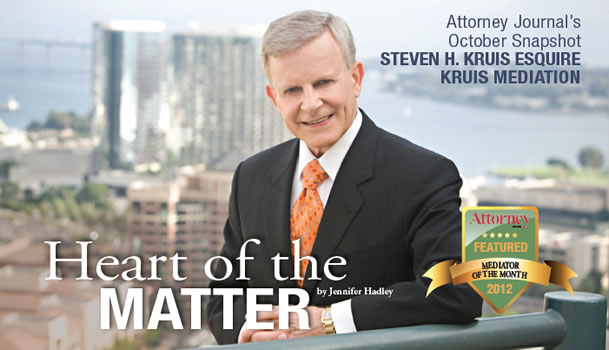Heart of the Matter
By Jennifer Handley
Attorney Journal's October Snapshot, October 2012
For nearly 20 years, Steven H. Kruis has served the San Diego legal community as a mediator in civil cases spanning the spectrum from complex business disputes to real property claims, labor and employment disputes, personal injury claims, and a vast number of probate and trust disputes.
Although he sticks to civil matters, it is, metaphorically speaking, precisely the lack of civility that is responsible for so many disputes. An admitted lifelong student of the human mind, Kruis has devoted his life's work "understanding how we think," in order to benefit countless San Diegans who are involved in legal disputes and are desperate just to be heard.
According to Kruis, a Martindale-Hubbell AV-rated attorney and former Managing Partner with Higgs, Fletcher & Mack, "people want to express themselves. Litigation does not allow for it. Even cases that appear at first to be rooted in financial disputes are often very emotional for those involved," he says. In part, that may boil down to science. "When the limbic system (responsible for feelings and emotions) is in charge, the neocortex (which is responsible for logic and rationality) can't win."

Through years and years of experience, Kruis has learned that parties in dispute almost always reach an impasse if the emotional component is not addressed. Fortunately, more often than not, that emotional weight is lifted simply through having one's position heard by the opposing party. Then, and only then, can the parties involved get to a place where agreement and compromise become a realistic goal.
In order create a space where each party has their chance to be heard, Kruis works hard to facilitate an environment that provides a comfortable, relaxed platform for all parties to have their emotional say. Once this platform has been established and each party has had their chance to express the emotional components, the odds of reaching a rational compromise or settlement multiply exponentially.
To do this, Kruis has recognized that he must remain a true neutral, and that extends to his style of mediating. Far from utilizing a strong arm or evaluative approach-which he concedes certain attorneys do want and need in certain matters- Kruis is neither this type of aggressive mediator, nor is he a passive mediator. He's, frankly, somewhere in the middle, which is coincidentally where he strives to guide his clients to meet.
"I spend a lot of time listening, and through providing an environment where people feel heard, I am therefore able to help each party get a more realistic view of their own case," he says. Often, once the emotions are neutralized, parties are finally able to appreciate the strengths and weaknesses of their own cases, and are able to come to terms with risks involved in not settling the case." n
Attorney Journal | Volume 110 | October 2012
